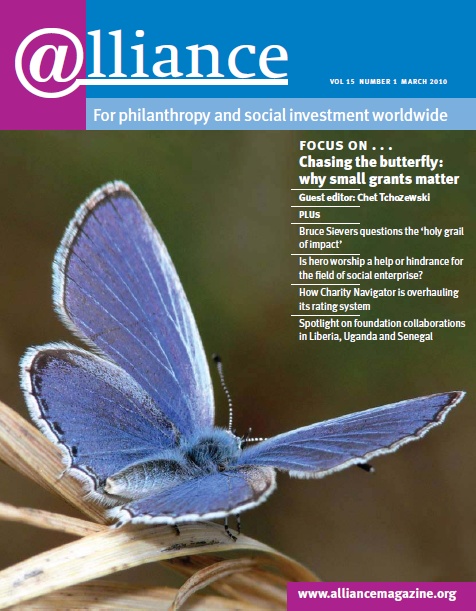At the end of the first decade of the new millennium, it is clear that many countries will fail to meet several of the Millennium Development Goals by 2015. Compelling reasons might be advanced for this, but we should all feel more than a tinge of guilt for failing to attain standards that themselves fall well below aspirations that existed prior to the Millennium Declaration. In my optimistic moments, however, I believe that progress has been made, not just in pursuit of these goals but also in attempting to marshal the political will that, in many cases, is the missing ingredient in the drive to achieve the MDGs. It may be that grand schemes are always doomed to fail, but that working towards them nevertheless prepares the ground for small interventions whose cumulative effect can be enormous. Small grants both support and themselves constitute such interventions.
I come from the school of thought that perceived the MDGs as representing a ‘minimum development agenda’. I would like to think that while we acquiesced in the powerful wave that made the MDGs the widely accepted measure for development, many of us still hoped that we could hold ourselves, even if silently, to higher standards.
One of the areas where I think important gains have been made over the past decade is in what I would broadly call ‘awareness creation’. This could be credited to a range of factors, such as the adoption of the rights-based approach to development by many practitioners and the vigorous attempts that have gone into promoting the MDGs. With increasing awareness, one cannot ignore the growing sentiment in society for the kind of change that would improve people’s living conditions or, at the very least, accord them their basic rights.
I believe this sentiment, and a recognition of the emerging opportunity it presents, led to the creation of Akiba Uhaki,[1] a human rights and social justice fund which seeks to establish itself as a proactive and innovative grantmaking institution working across East Africa.
As a new player in this field, I am particularly encouraged by the emergence of a trend that is discernible as we at Akiba Uhaki interact with a variety of community groups and individuals across the region – a trend whereby growing awareness translates into the first ‘hopeful’ signs of empowerment, which in turn translate to community groups beginning to insist on accountability from those in positions of responsibility and to demand their rights more consciously and assertively than in the past. Through small grants, we have contributed to the efforts of these groups to organize themselves, deepen their understanding of the situations they are in, take ownership of the challenges they face, and collectively try to develop systematic approaches to addressing them. There have been instances where small grants have been particularly valuable when given to minority groups that need to organize themselves and develop their capacities to know and defend their rights.
Small grants have in several cases helped to close the gaps between these often far-flung groups as they get to know about the existence and aspirations of others ‘of like mind’ and seek to interact with them in ways that enable them to learn from each other, form appropriate strategies, and even take actions that aim to secure the participation of larger numbers of people – thus forming the basis for the emergence of social movements that will pursue the change that many in society yearn for.
In numerous cases like this, small grants have been usefully applied to plug the gaps that get in the way of potential collaboration. It may be as basic as making a contribution to travel costs for members of a group to attend a brainstorming/planning session or visit another group to compare experiences; or meeting the costs of holding a meeting – hiring a venue, tents and chairs. There have been instances where small grants have been particularly valuable when given to minority groups that need to organize themselves and develop their capacity to know and defend their rights.
Being a regional fund, Akiba Uhaki is actively looking both to help strengthen the entire human rights and social justice sector through strategic support to existing institutions working in the region and to stimulate creativity in addressing the glaring imbalances that exist in East African societies today. Small grants, used strategically, have great potential to contribute to the growth of citizen agency – and it is only through citizen agency that development goals, Millennium or otherwise, will be achieved.
1 Akiba is the Swahili word for savings or investments, while uhaki is an acronym for ‘Uteteaji wa haki za kibinadamu’ or ‘the protection of human rights’. Akiba Uhaki is a fund dedicated to the protection and promotion of human rights inclusive of social justice.
Ezra Mbogori is executive director of Akiba Uhaki. Email limirimbogori@hotmail.com



Comments (0)